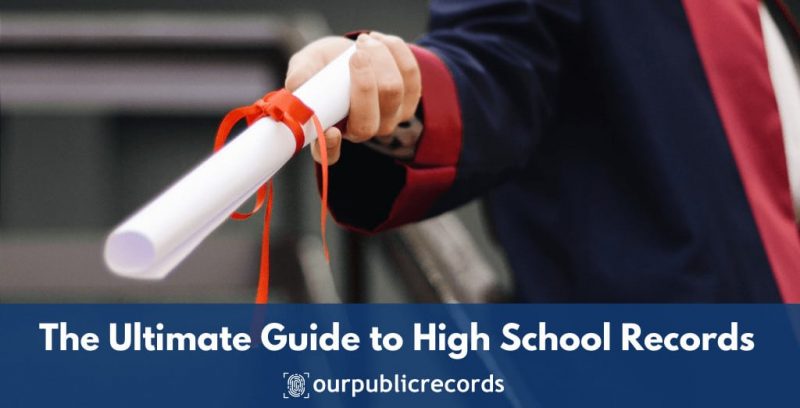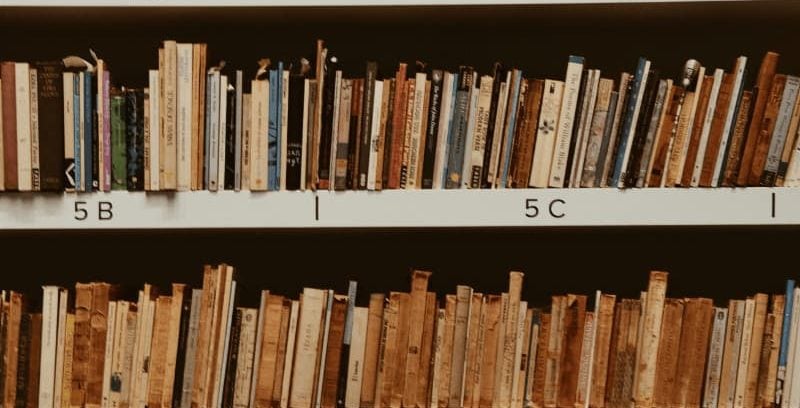UPDATED October 2024
Find out more about students and others you knew in school with a look at the ultimate guide to high school records on the web.

The Ultimate Guide to High School Records
Everyone has a different high school experience. While some loved the years they spent there and made friends they still talk to years later, others had bad experiences that made them look forward to college. No matter how you felt about high school, you may want to access high school records to see what happened to some of your classmates and friends along with your teachers. Was there one teacher who touched your heart and encouraged you to pursue your dreams? With the right public records, you have the chance to reach out and touch them to let them know what they meant to you.
Many people use public records as a way to track down their old flames, too. After you go through a bad divorce or break up, you might look back fondly on your high school boyfriend or girlfriend and wonder if they still think about you. Public records help you track them down and send them a message whenever you want. You’ll also find ways to request your school transcripts and yearbooks along with other types of records. Here at OurPublicRecords.com, we’ll show you all the different types of high school records that are available and what they tell you along with how to request them.

High school records are available from most schools as well as online.
What are High School Records?
High school records refer to any type of records held by a school and include both public and private high schools. While most high schools are open for students between the ages of ninth and 12th grades, some welcome students in the eighth grade, too. These schools offer advanced courses designed to prepare students for the future. High schools often maintain records such as yearbooks that show the names and photos of the students who attended the school during a certain year. There are also directories that include the contact information for past and current students along with transcripts that show the classes a student took and the grades they received. There are other types of public records that provide you with information about schools and students, too.
Middle School/Junior High vs. High School
Both middle schools and junior high schools are schools designed for younger children. While a middle school often accepts students in sixth through eighth grades, a junior high only accepts seventh and eighth graders. These schools may also accept students up through the ninth grade and kids as young as fifth grade. Students take courses in different subjects that prepare them for high school such as Algebra. They also learn the basics of changing rooms and getting to their classes before the bell rings to signal the new period. You may find records from some of these schools online.

Many schools have information request forms that you can complete online to get the records that you want.
The History of High Schools in the United States
Though you might think that high schools existed for centuries, secondary education is a modern concept. Up through the 19th century, many students only attended eight years of school or less. The National Education Association created the Committee of Ten in 1892, which decided that all students deserved the right to higher education and access to the same subjects. By the beginning of the 20th century, the high school movement swept across the nation. This led to high schools opening in major cities and smaller towns that offered both practical training for those who wanted to work as well as courses that prepared students for college. This would eventually lead to an exit exam that students needed to pass to show that they learned the necessary skills to graduate.
Public vs. Private High Schools
Whether you attended a private or public high school, you can look for the records that you want. Public schools provide free education for all the students who live in the surrounding school district and get funding from the state and federal governments. Though students may face fees to join certain clubs or organizations, they do not need to pay fees to take classes. Private schools may receive some government funding but usually, receive funding through the annual fees that they charge students. There are also prep academies, which are schools designed specifically for students who plan to attend college. These schools are so small that the total number of students who attend them equates to less than 1% of all high school students.
Vocational Schools
Students who do not want to attend college can enroll in vocational schools. These schools provide students with training that helps them find work once they graduate without taking any additional classes. An early childhood education program prepares students for working in daycare centers with children. A phlebotomy program helps students become licensed phlebotomists at the end of their training. Vocational schools may offer culinary arts and auto repair courses along with other programs, too. Even if you attended one of these schools, you still have the right to view its public records.

Both public and private high schools have records available for those who need them.
What Constitutes a High School Record?
A high school record is essentially any type of record that a school has in its archives. We’ll go over some of the different types to give you an idea of what you may want to request.
Permanent Records
Do you remember hearing your teachers talk about your permanent record? Teachers often claim that anything bad that a student does will go into their permanent record and affect their future. Though you might think that this is just a threat that teachers use, permanent records do exist. The records usually contain a list of all the comments that your teachers made about you along with reports of the times that they sent you to the principal’s office. They may list any times you were late to class or missed school, too.
Contracts
One of the rare types of documents that you might request is an official contract between the school and one of its vendors. Schools use a lot of different vendors to provide for their students, including companies that stock and service their vending machines and those who are responsible for making their uniforms. Some schools give you the right to view a contract if you know the name of the listed company. You may find that you can only view these records during specific times of the year.
Yearbooks
When you’re in high school, you have the right to buy a copy of your yearbook. Schools set aside one day or multiple days every year to take pictures of their students and the clubs and organizations they join. Yearbooks often contain the name and grade of each student along with a photo. You’ll also see the names and photos of your teachers along with sponsors who bought ads in the back of the book. Many schools keep copies of former yearbooks in their library or archives.

Check with your school to see what types of public records are available.
Directories
Directories are different from yearbooks because they contain more information about students who attended a school in a certain year. Schools that use directories often send home forms with their students that allow parents to opt-out if they don’t want their child’s information to appear in the directory. Directories often include the name of each student and a minimum of a home or contact phone number and may include a home address, too. This helps students get in touch with each other when they need help. If you’re planning a high school reunion, a directory is a big help.
Athletic Programs
If you were a student-athlete, consider looking for copies of your old athletic programs. Athletic programs are small documents handed out or sold at high school games. They usually list at least one photo of the team along with individual photos of each player and pictures of the coaches and assistants. Some programs may include interviews with players or information about their hobbies and interests. You’ll also see ads inside from local companies who sponsored your team. Athletic programs are a great way to look up the names of other players on your team.
Transcripts
You may not need a copy of your transcript once you finish high school, but it can remind you of the classes that you took. A transcript is an official record that shows you earned your high school diploma. It lists all the courses that you took in each semester along with the grades that you earned in each one. A transcript should also list your grade point average at the end of each semester as well as your cumulative GPA and how it changed after you took different classes.

You don't need to dig through file cabinets as many school records are now available online.
Compliance Files
Some schools use separate files within permanent records such as compliance files. A compliance file is often available for students who meet the guidelines of the Individuals with Disabilities Education Act. It makes note of the restrictions that the student has and what they can and cannot do. A compliance file will also record any meetings that the student’s parents had with the school and the results of those meetings. It may make note of the rules that the school established and what it did to assist with the student’s disabilities. You have the right to request your compliance file if one exists.
Discipline Files
Though some students have positive high school experiences, others had some problems that led to the school creating a discipline file. This contains a full list of any issues that you had with the school and your teacher as well as your classmates. Did you ever get in trouble and had detention once or twice? Your file will show all the times that you served detention. It will also make note of any other punishments that you received such as a one-day suspension or a few Saturday school visits. Not all students have a discipline file.
High School Newspapers
You should check to see if your old high school archived its newspaper online. Newspapers are a great way to remind yourself of the big events from your younger years and to find photos printed in the paper. Most papers list the scores from games and the names of students who participated in big events. You will often find that newspapers run interviews with former students to show current students what the future might hold for them. Those interviews may give you a good idea of what happened to your best friend from high school and where they now live.
Cumulative Files
Cumulative high school files are similar to permanent records but may contain more information. The file features all the data that the school used to identify you, including your school number and a copy of your photo ID. It should include copies of all of your report cards from the school and records that show you got all the required vaccinations. Schools also use these files to keep track of a student’s achievements and any reports that teachers wrote about them. Some schools use cumulative files in place of permanent records and discipline files.

Check all of the online resources that you can find for high school records before calling your old school.
Activity Records
Don’t forget to ask your school about activity records, which relate to certain activities that you did or clubs that you joined. Let’s say that you joined a writing club that participated in competitions with other schools. Your school should have a record the indicates where you placed in those events. The record may include copies of all the writing that you did, too. Model UN is another club that often keeps records of former students. Keep in mind that some schools do not have enough room to store these records forever and may not have them when you look.
Why High School Records Matter
Whether you look back fondly on your high school years or want to forget about them, high school records still matter. Many employers need proof that you have your high school diploma before extending job offers. If you lost your diploma for any reason, you can talk to your high school and request either a copy of it or your transcript to show that you have the education level needed for the job.
Disasters can happen at any time and any place, including a fire that destroys your whole home or a flood that damages your important files. You may find that you only have your memories of high school left. High school records can help you get copies of yearbook photos that show you and your friends along with shots of you in action on the basketball court or in the middle of a Model UN session.
High school records also matter to those looking for old friends and planning reunions and other events. You might find information that helps you track down your former best friend or significant other. Thanks to Facebook and other social media sites, you may think that you can find anyone with just a few clicks of your mouse. Not everyone uses social media though, and many people do not list their real names on those sites. You can use high school records to find people when you can’t locate them online.

High school records help you easily find people when they don't have a virtual footprint on the web.
How High School Records Compiled
Unlike other types of public records that the government compiles, high school records are the responsibility of the school itself. The methods that schools use will depend on the type of record. Take for example the yearbook. Most schools have a yearbook club or class that allows students to work together to create and put out the next issue. Not only do they take photos of student clubs and teams, but they also capture moments during a normal day such as a group hanging out in the parking lot or watching the team in action. With transcripts, the school uses the information provided by teachers to compile and create the records.
Other types of records are compiled by those working in the principal’s office. They are responsible for making sure that the letters and reports they receive go into the right files that include the student’s name. This includes reports on any disciplinary issues, letters that teachers wrote about their experiences with the individual and other details. It may also contain copies of any awards that you won. Schools will place the files in a cabinet and keep them for many years.
If you want to make sure that you can find your files and records later, make sure that the school has a way to contact you. You want to update your parent’s address or use your address. Schools will often send notices when they purge their files, which gives students the chance to collect theirs.

Updating your contact information ensures that you get your file before the school destroys it.
Where to Find High School Records
You have a few options when it comes to finding old high school records. We recommend that you start at the high school itself. Many schools today have official websites, even if the site doesn’t have a lot of information. You can look for a phone number and call the principal’s office to speak with a secretary. Let them know what you want to find and leave your contact information. If you work odd hours and don’t have time to speak with someone directly, you can send a quick email. The school’s library can often help you find archived materials such as yearbooks and athletic programs.
If you find that the school no longer exists, contact the Office of Education in the county where the school was. This office can help you find out what happened to the school’s records. Though many schools absorb the records of closed schools when their students transfer, you may find that the Office of Education has them. You can also contact the State Department of Education, which is responsible for overseeing all the schools in the state. Even if the department does not have the records that you want, they can push you in the right direction to find them.

You can find people to help you track down high school records from the comfort of your home.
High School Records and What They Reveal
High school records can reveal more information than you ever thought you would find. Take for example an official school directory from your freshman year. The directory will list the name of each student enrolled in the school and may include a photo. Though some parents do not let their children participate in the directory, many do. You can easily find a student’s phone number and maybe even their home address. This gives you a way to contact old friends you lost touch with over the years. Though they probably no longer live there, you can send a letter and ask their parents to forward it. If you feel brave, you can call and explain who you are. Their parents may agree to pass along your information.
Some records can help you remember the names of people you forgot, too. Did you have a teammate you played with but can’t quite remember his name? An athletic program lets you see that person’s name and position on the team. You may want to use high school records to make amends to someone you bullied in high school, too. Many types of records will help you track down people who do not use social media sites. You’ll also find records that let you see how you did in high school and proof that you completed your studies.

You'll find loads of online and traditional records when you know where to look.
Searching High School Records
Searching for high school records may not take as much effort as you think. Always start at the school you attended. You can visit the official website to see if any records are available online and view a list of upcoming events. When you go to a high school basketball or football game, you might find yourself surprised at how many of your classmates attend, especially if they still live in the area. They may even show up to support their children who now attend the school.
To make the most of your search, make a list of the information that you want to find. This gives you an idea of which records will help. Do you want to find an old significant other? Searching social media under their maiden and married names can help. If you want to plan a reunion with your old team, social media is also helpful. For records that show your grades and classes, you’ll want to look for official records from the high school, which may not be available online.

Don't get discouraged if you can't find what you need online because you may need to contact your school.
How High School Records Search Work
A high school records search may take more or less time than you guessed. It depends on what type of records that you want to track down. You can try some of the tips that we recommend as you search.
- Expand Your Network: A big mistake that some make is that they give up when they don’t find all the records they needed. When you expand your network, you never know what you might find. Consider getting in touch with your old teachers to see if they kept records from their classes. You may want to contact school administrators, too. The more people you reach out to, the more you can find.
- Think Outside the Box: You may want to think outside the box and consider methods that you didn’t consider before. If you know the names of former substitute teachers, reach out to them.
- Search By All Names: When searching for specific people, use as many names as possible. You might find that an old friend uses Facebook under a nickname rather than their given name.

Use all of the available resources to make sure that you find all of the records that you need.
Where to Look for Online Resources
There are quite a few places to look for high school records online, including right here at OurPublicRecords.com. You can use the links across the top of this page to navigate through our records searches. If you know that someone you went to high school with got married, our marriage records show you how to track them via their married name. Our criminal records page goes over the top ways to search and view criminal records online. You’ll also find help on using police and arrest records or finding general public records. As long as you have the name of your old classmate, you can easily use public records to find them.
We also recommend using your favorite social media sites. Facebook is the best place to start because many schools have alumni groups. You may find a general group for everyone who attended the school or one for just your class. Many schools skip in-person reunions in favor of online meetings where classmates can chat with each other. Facebook also lets you request your classmates as friends and send them direct messages. Even if you don’t find an alumni group, you can search for individual users on the site.
Classmates.com is another helpful resource. You simply pick the state where your school was and choose your city. Once you find your school, you can see how many people from your school use the site. Signing up for an account lets you post on the message board and chat with your old friends. The site also has yearbooks that users uploaded. Though you may find that not all of your former classmates use the site, you can chat with those who do to find your missing friends.

Use the web to your advantage when searching for high school records.
Start Your Research Today
Whether you want to locate an old flame or a best friend, high school records can help. Some of these records also let you share your glory days with your kids and remember the great times that you had in high school. At OurPublicRecords.com, we can help you find hundreds of public records on the web, including those that assist you in tracking down old friends. Between online and traditional resources, you can find any type of high school record while relaxing at home or on the move.
Quickly and Easily Search Almost Anyone's:

Disclaimer: We rank sites based on our knowledge and experience. Our team visits each site and evaluates each one before placing it online. Though we do accept referrals, we guarantee that the information we share is accurate and that we will only pass on information that we think is helpful to our visitors. The referral fees that we receive go to paying our team and keeping our website operational.
OurPublicRecord.Org is a privately owned and operated website and is NOT affiliated with the US Government or any law enforcement agency.